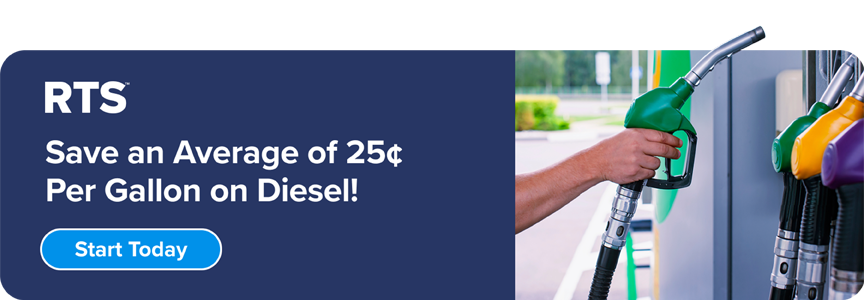
Top Issues Facing Fleets
According to a fleet manager survey by WEX Inc., here are the top challenges of operating a trucking fleet:
- 26% Maintenance, service and repairs
- 23% Fuel Costs
- 18% Reporting and tracking
- 18% Unauthorized purchases
- 16% Driver compliance and safety
- 10% Paperwork and documentation
- 9% Location mapping/GPS
- 8% Logistics and scheduling
- 8% Driver shortage
Studies show that, for every dollar the average American trucking company earns, it spends 95.2 cents on operating costs. That leaves a profit of only 4.8 cents. With such a thin margin to work with, trucking fleets need to save money wherever they can, particularly on diesel fuel. Membership to a fleet fuel card can help generate those savings for carriers of any size.
You have likely heard many things about fuel cards from people in the trucking industry. Before deciding what kind of card is right for your fleet, you will want to understand how fuel cards are structured and operate, as well as the benefits they can provide.
Below are answers to some common questions about fuel cards and how they work.
Who Uses Fuel Cards?
Fleet fuel cards are ideal for over-the-road trucking companies that buy diesel at truck stops for class 7 and 8 commercial trucks. Typical customers include contracted carriers, private fleets, less-than-truckload carriers and independent owners/operators. Finding the best fuel card for a small trucking company or an expansive fleet is easy, as fuel cards are designed to benefit carriers of all sizes.
How a Fuel Card Can Help Your Trucking Company
How Does a Carrier Benefit?
A good fuel card program offers carriers significant per-gallon discounts on diesel, as well as savings on other services.
Fuel cards are partnerships designed to drive sales for fuel station merchants. When a fuel card provider sends its members to partnering truck stops or fuel stops, it receives a cut, usually 2% to 3%, of the fuel sales. To drive more fuel card members to their fuel stops, the merchants offer exclusive discounts on the per-gallon price. These discounts may be different at each fuel stop location and can change daily, based on fuel prices and settlement rates between the merchant and the fuel card company.
As a carrier, you want a fuel card that consistently offers strong savings on diesel at locations along the lanes your company runs. Finding a card program that provides the right blend of discounts and flexibility can help your fleet save thousands of dollars a year on fuel.
How Are Fuel Savings Calculated?
Per-gallon fuel discounts are negotiated between the merchant and the fuel card company. There are two models of savings offered by most fuel card companies: “retail-minus” and “cost-plus.”
Retail-minus is exactly what it sounds like. A certain amount of money is deducted from the per-gallon retail price of fuel. Those savings are passed along to the fuel card customer.
Cost-plus is a little more complicated. An independent agency called the Oil Pricing Information Service (OPIS) determines the base or “rack” price of fuel for each location. Taxes and transportations costs are added to the base price. The “plus” comes in when other fees are added. The “cost-plus” fuel card model is often cheaper than the “retail-minus” model in parts of the country like California and Hawaii, where transporting fuel to merchants is more expensive.
Some fuel cards offer fleets a “better of” option. With each fuel purchase, the card will automatically select which of the two pricing models provides the most savings. This allows fleets and drivers to avoid switching back and forth between retail-minus and cost-plus. With “better of,” fleets will always get the best available pricing.
What Happens When You Swipe the Card?
Some fuel card companies charge a small, fixed transaction fee each time your fleet uses the card to purchase diesel. Depending on where you fuel up and what card you are using, your savings may be immediate or sent to you in a check later in the month.
Some merchants provide point-of-sale discounts, meaning the fuel cost is reduced at the point of settlement. The fleet pays the reduced cost to the fuel card company and the fuel card company pays the reduced cost to the merchant.
Other merchants prefer a rebate model. That means the full cost of fuel is billed to the fleet at retail. The fleet receives a check at the end of the month for the total amount of money discounted from the fuel purchases. The rebate model can sometimes confuse drivers who fuel up, see the full retail price on their receipt and do not think they are receiving the discount.
What are Some Other Reasons to Use a Fuel Card?
As you search for the best fuel card for a small trucking company or growing fleet, it's important to consider how these programs can benefit you beyond saving money at the pump. Here are some additional benefits of finding the right fuel card for your company:
- Spending Control. Many fuel cards provide weekly credit lines and PlusChecks that drivers can use to pay expenses on the road. Each fleet can limit and monitor the amount of money drivers spend with the fuel card, reducing the chance of fraud. This is a far safer approach than giving drivers an unrestricted credit card or a wad of cash to use on the road.
- Fleet Management. Some fuel cards provide fleets with online accounts that contain real-time, detailed reporting on all transactions. You can customize these reports to identify which drivers are spending the most on fuel, what retailers offer the best deals and how you can operate your fleet more efficiently. You can monitor, score and compare drivers’ behavior, and pinpoint routes and fuel stops that offer the most fuel savings for your trucking fleet. The data you collect from your fuel card account can also help with your fleet’s quarterly IFTA filings.
- Communication. With fuel prices fluctuating daily, it is important to have a fuel card company that regularly communicates the latest fuel discounts throughout its retail network. Some fuel cards have mobile apps you can access on your smartphone or tablet to find the lowest fuel prices across the country. This saves you time planning your routes and eliminates paying too much at the pump.
- Other Savings. While saving money on diesel is usually the main draw to using a fuel card program, many programs offer other ways to save as well. Depending on the fuel card, trucking companies may also receive discounts on maintenance, tires, repairs, document scanning, lodging and other common expenses of operating a trucking company.
Fuel Card Offerings From RTS
RTS offers three distinct fuel card options to meet the needs of owner-operators and fleet managers.
RTS Fleet One Fuel Card
Our standard fuel card providing discounts on fuel, maintenance and truck care at locations nationwide.
RTS Self-Funded Fuel Card
Available regardless of credit history and offers the ability to load funds via debit card with no fees or credit card.
RTS Mixed Fleet Fuel Card
Convenient, all-in-one card for fleets of any size with both gasoline and diesel vehicles.
To learn more about how RTS can help you save money on fuel, contact us about our fuel card program.